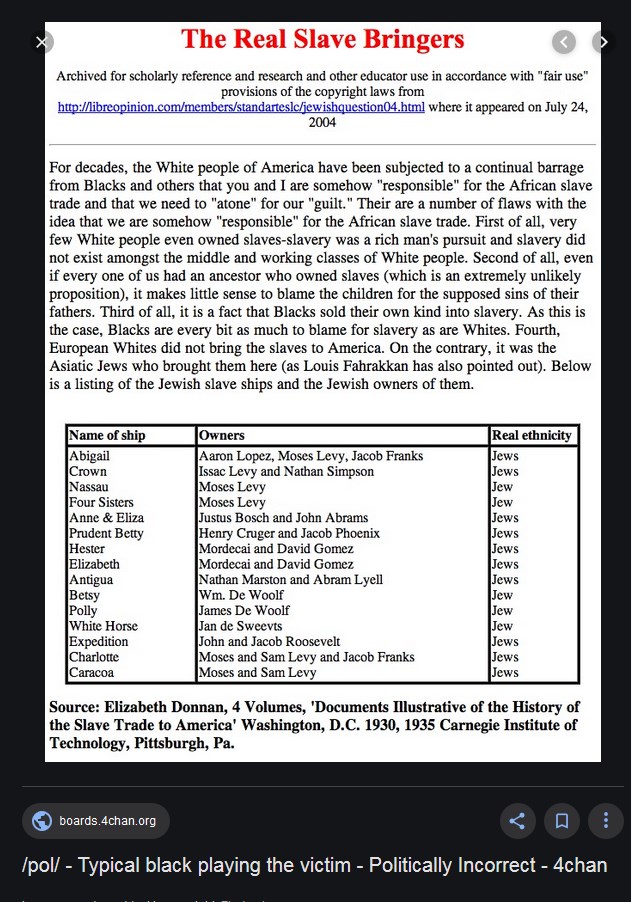Hidden Facts about Slavery in America - Jewish slave owners, Irish slaves
Hidden Facts about Slavery in America
http://www.iamthewitness.co...
http://www.rense.com/genera...
http://www.todayifoundout.c...
http://www.globalresearch.c...
Jews and Slavery:
"The trade in slaves constituted the main source of livelihood for the Roman Jews, and decrees against this traffic were issued in 335, 336, 339, 384, 415, 417, 423, 438, and 743."
http://www.jewishenc...cles/12816-rome
"In the dark ages the commerce of western Europe was largely in his [the Jew's] hands, in particular the slave trade, and in Carolingian cartularies [registers] Jews and merchants are used as almost interchangeable terms."
http://books.google.co.uk/b...
"One type of business carried on in the early Middle Ages by the Jews of Europe, namely the slave trade, requires a special word of explanation. The Jews were among the most important slave-dealers. As inhabitants of western Germany pushed their way deeper and deeper into Central Europe, driving the Slavic inhabitants farther eastward and taking away their land, they brought back captives whom they sold to Jewish traders. The Jews, in turn, transported these slaves to other lands to be sold to Christian and Mohammedan masters."
http://books.google.co.uk/b... (page 312)
"Even in the days of the secession crisis, and the subsequent prolongated war and eventual defeat, many Southern Jews believed slavery to be indispensable to their happiness and security."
http://books.google.co.uk/b...
"On the Caribbean island of Curacao, Dutch Jews may have accounted for the resale of at least 15,000 slaves landed by Dutch transatlantic traders, according to Seymour Drescher, a historian at the University of Pittsburgh. At one point, Jews controlled about 17 percent of the Caribbean trade in Dutch colonies, Drescher said.
"Jews were so influential in those colonies that slave auctions scheduled to take place on Jewish holidays often were postponed, according to Marc Lee Raphael, a professor of Judaic studies at the College of William & Mary.
"In the United States, the Jewish role in the slave trade has been a matter of scholarly debate for nearly two decades, prompted in part by efforts to refute the Nation of Islam’s claim that Jews dominated the Atlantic slave trade. But in Holland, the issue of Jewish complicity is rarely discussed."
http://www.jta.org/2013/12/...
"Jews also took an active part in the Dutch colonial slave trade; indeed, the bylaws of the Recife and Mauricia congregations (1648) included an imposta (Jewish tax) of five soldos for each Negro slave a Brazilian Jew purchased from the West Indies Company. Slave auctions were postponed if they fell on a Jewish holiday. In Curacao in the seventeenth century, as well as in the British colonies of Barbados and Jamaica in the eighteenth century, Jewish merchants played major role in the slave trade. In fact, in all the American colonies, whether French (Martinique), British, or Dutch, Jewish merchants frequently dominated.
"This was no less true on the North American mainland, where during the eighteenth century Jews participated in the 'triangular trade' that brought slaves from Africa to the West Indies and there exchanged them for molasses, which in turn was taken to New England and converted into rum for sale in Africa. Isaac Da Costa of Charleston in the 1750's, David Franks of Philadelphia in the 1760's, and Aaron Lopez of Newport in the late 1760's and early 1770's dominated Jewish slave trading on the American continent."
http://books.google.co.uk/b... (page 14)
"All through the eighteenth century, into the early nineteenth, Jews in the North were to own black servants; in the South, the few plantations owned by Jews were tilled with slave labor. In 1820, over 75 percent of all Jewish families in Charleston, Richmond, and Savannah owned slaves, employed as domestic servants; almost 40 percent of all Jewish households in the United States owned on slave or more. There were no protest against slavery as such by Jews in the South, where they were always outnumbered at least 100 to 1; discretion was held imperative if they were to survive. But very few Jews anywhere in the United States protested against chattel slavery on moral grounds."




